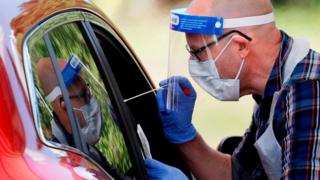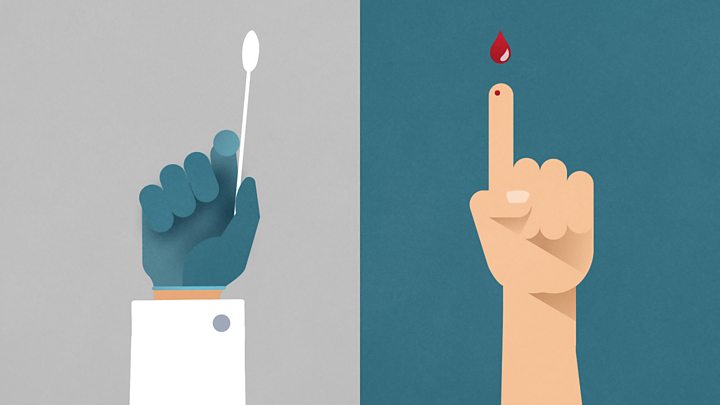Coronavirus: What tests are being done in the UK?
 Image copyright
Getty Images
Image copyright
Getty Images
The government says it can now test 200,000 people a day for coronavirus. It aims to process tests within 24 hours by the end of June.
The tests are seen as vital to controlling Covid-19 as the lockdown eases.
Can I get tested?
In England and Wales anyone with symptoms can get a swab test.
In Northern Ireland and Scotland anyone over the age of five with symptoms can get tested.
People working or living in care homes can be tested even if they don't have symptoms.
How does the test work?
The test finds out if you currently have the virus.
It involves taking a swab up the nose and the back of the throat, which can be done by the person themselves or someone else.
These tests won't show if you have had Covid-19 in the past.
Antibody tests - which do look for evidence of past exposure - use blood samples.
The UK now has capacity for 40,000 antibody tests a day, but these are only offered to health and care staff.
How long does it take to get a result?
Couriers collect samples and take them to laboratories.
Prime Minister Boris Johnson has pledged tests would be processed within 24 hours by the end of June, except where there were difficulties with the post.
Baroness Dido Harding, the head of the Test and Trace service, has said 84% of drive-in centre tests come back within a day. No figure has been provided for home kits.
Speed is important because delays give the virus more time to spread.
How reliable are the tests?
Scientists at the University of Bristol believe 20% of positive cases could falsely appear as negative, wrongly telling someone they are not infected.
Baroness Harding said false negative results range between "two and 20-odd percent".
The Hospital Consultants and Specialists Association (HCSA), which represents hospital doctors, has called NHS staff to be tested more than once.
Why is testing important?
Testing is essential if contact-tracing systems now in place across the UK are to work effectively, help stop the spread of the virus and avoid the need for UK-wide lockdowns.
Tests can also help people, including NHS workers, know whether they are safe to go to work.
They can also let the health service plan for extra demand and inform government decisions around social distancing.

What is contact tracing?
People who test positive for Covid-19 will be told to self-isolate for 14 days - and their recent close contacts will be traced and told to do the same, even if they don't have symptoms.
Close contacts include household members and anyone who has been within 2m of the positive person for more than 15 minutes.
Read more about contact tracing in England, Scotland, Wales and Northern Ireland.
How many tests are being carried out?
During the coronavirus epidemic, the government has been challenged over its testing capacity and the data presented at daily briefings.
On Sunday, Matt Hancock announced the UK had exceeded its target to increase coronavirus testing capacity to 200,000 a day by the end of May.
But only about 115,000 tests were actually carried out in the 24 hours to 09:00 BST that day - and that figure includes testing kits posted out to homes.
The chairman of the UK Statistics Authority criticised the presentation of the daily figures, saying they appeared to be aimed at showing "the largest possible number of tests, even at the expense of understanding".
Some people are tested more than once - either to prove they no longer have Covid-19, or because a negative result appears incorrect given their symptoms, or because the first test doesn't work.
A government spokesperson said it was working with statisticians and that the approach throughout had been to "increase transparency".
Where do I get tested?
There are several options.
You can travel to a drive-through testing site, visit a mobile testing unit or get a home testing kit delivered.
Testing at an NHS facility, such as a hospital, is available for patients and some NHS workers.
Follow Rachel on Twitter
What do I need to know about the coronavirus?
Have you been tested? Or are you waiting for a test?
Please include a contact number if you are willing to speak to a BBC journalist about your experience.